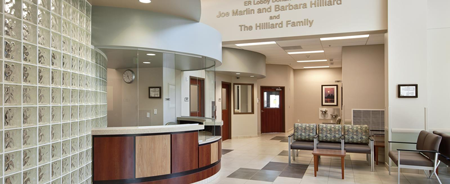
This is a picture of the lobby for the Emergency Department.
Emergency Department
A medical emergency can be the most frightening crisis a person ever faces - but at Hendry Regional Medical Center, you don't have to face that crisis alone. Our Emergency Department is ready to assist you and your family with compassionate, state-of-the-art emergency medical care, seven days a week, 24 hours a day.
Hendry Regional Medical Center's Emergency Department is equipped with 10 beds and treats approximately over 16,000 patients a year for problems ranging from life-threatening heart attacks to broken bones.
An experienced emergency physician, registered nurses, laboratory and imaging personnel, and other fully trained support staff are all standing by.
The Emergency Department - Why Are We Here?
We are here to handle most emergencies, but not extreme trauma situations. Those cases, such as extensive burns or multiple crushing traumas, are stabilized here and transferred to major urban centers for more highly specialized treatment.
As our name says, we treat people who have medical emergencies. The treatment of routine illnesses and the diagnosis of non-critical symptoms are best left to your personal doctor. (HRMC does not provide Obstetrical services.)
What to Expect When you Come to the Emergency Department
Waiting: Triage is the first service you will receive as an emergency patient. A nurse will do an initial exam that includes taking your blood pressure, temperature and pulse. These simple steps tell us a lot about your medical condition. More important, they help us identify patients who need to see a doctor right away and also those whose conditions are not as urgent. We realize that your time is important and that waiting can be frustrating when you are uncomfortable or frightened, but patients with more serious problems must be seen first. Laboratory tests, x-rays or other procedures may also increase your wait in the Emergency Department.
When you're a patient or are accompanying a patient, we encourage you to leave children with a responsible adult rather than bringing them to the Emergency Department. Even for the best behaved children, waiting in a small, busy area can be very challenging.
What we may need from you: As we mentioned, Emergency Departments see patients based on the severity of their illnesses or injuries, not on a first-come, first-serve basis. With that in mind, American College of Emergency Physicians (ACEP) offers the following tips to patients when they come to an Emergency Department in order to get the best possible care as quickly as possible:
●Bring a list of medications and allergies: What's the name of the medication you are taking? How often do you take it and for how long? A list of allergies is important, especially if there are many of them. Be sure to include medications, foods, insects or any other product that may cause an allergic reaction. Bring a medical history form with you. To log your medications for your next hospital visit, print a prescription wallet card.
●Know your immunizations: This will likely be a long list for children; mainly tetanus, flu and Hepatitis B for adults.
●Remain calm: Obviously it is difficult to remain composed if you or family members have been badly injured, but a calm attitude can help increase communication with the doctors and nurses who are attending to your care.
We hope that you and your family are not faced with an emergency situation, but we're here for you if you should need us.
Disclaimer: Hendry Regional Medical Center is not able to provide medical advice over the phone or provide the name of the attending on-call physician.


